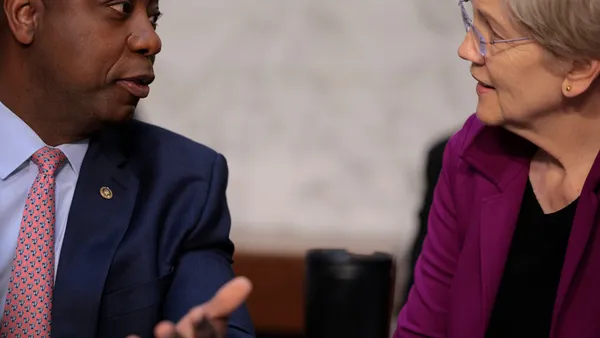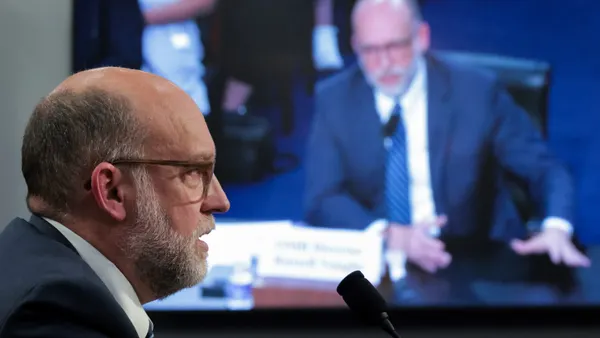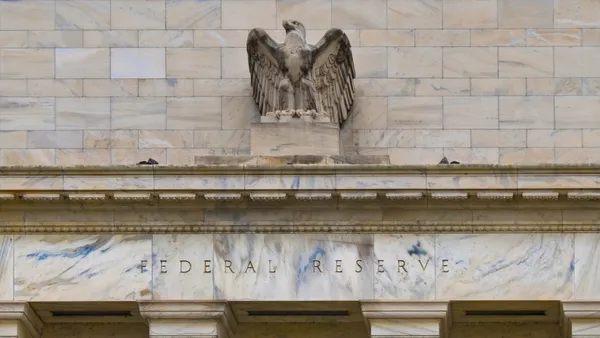Dive Brief:
-
The Federal Reserve is extending through the fourth quarter its ban on share repurchases, as well as its cap on dividends for banks with more than $100 billion in assets, the central bank announced Wednesday. The restrictions were set to expire that day.
-
The Fed aims for the move to "ensure that large banks maintain a high level of capital resilience" amid the economic uncertainty resulting from the coronavirus pandemic. "The capital positions of large banks have remained strong during the third quarter while such restrictions were in place," the central bank said.
-
The move may come as a disappointment to some banks. JPMorgan Chase, for example, said last month that it has excess capital and may use it to buy back shares in the fourth quarter if the Fed allowed it. "It will obviously depend on whether we have regulatory constraints, and we're going to be very, very prudent in terms of how we think about the number of different scenarios and what our capital looks like under those scenarios," Jennifer Piepszak, the bank's CFO, told Bloomberg.
Dive Insight:
Wednesday's announcement by the Fed extends restrictions first put in place in June, when the agency first ordered banks to suspend share buybacks and cap dividend payments in the third quarter to the amount paid in the second.
Dividend payments in the fourth quarter will be capped and tied to a formula based on recent earnings, the Fed said Wednesday. The June dividend restriction pushed Wells Fargo to cap its payout at 10 cents per share, down from a previous 51 cents.
The Fed board passed the extended restrictions Wednesday on a 4-1 vote, with Gov. Lael Brainard, as the lone dissenter. Brainard also dissented in June, calling for the central bank to suspend dividends instead of cap them.
"I do not support giving the green light for large banks to deplete capital, which raises the risk they will need to tighten credit or rebuild capital during the recovery," Brainard wrote after the Fed released stress test results in June.
She said she could not support a policy that "fails to learn a key lesson of the financial crisis."
Former Federal Deposit Insurance Corp. (FDIC) Chair Sheila Bair has also pushed for U.S. banks to suspend dividends. European regulators, meanwhile, imposed a de-facto ban on dividend payouts for banks there, a move Spain's Santander and France's Societe Generale criticized Wednesday.
The June moves to freeze share buybacks and cap dividends came on the heels of results from a Fed stress test that, for the first time, included a "sensitivity analysis," measuring banks' resilience under three hypothetical recessions: V-shaped, U-shaped and W-shaped.
The central bank said last month it would conduct a second round of stress tests later this year "to further test the resiliency of large banks." Results for the tests will be released by the end of the year and will be made public to give investors a better idea of the health of particular lenders. The Fed also asked the lenders to resubmit their capital plans this fall to reflect a more current economic picture.
The central bank published two hypothetical scenarios last month under which it will test 34 lenders. One is a "severely adverse" scenario assuming an unemployment rate that peaks at 12.5% at the end of 2021 and declines to 7.5%. It also features a sharp slowdown abroad and considers a 3% drop in gross domestic product (GDP) from now until the end of 2021.
An "alternative severe" scenario supposes an unemployment rate that peaks at 11% by the end of this year, declines to 9% and considers a 2.5% slip in the GDP through the end of 2020.
Each scenario is far more severe than the Fed's actual projections, which predict unemployment will drop to 5.5% by the end of 2021, and to 4% by the end of 2023, according to the Financial Times.












